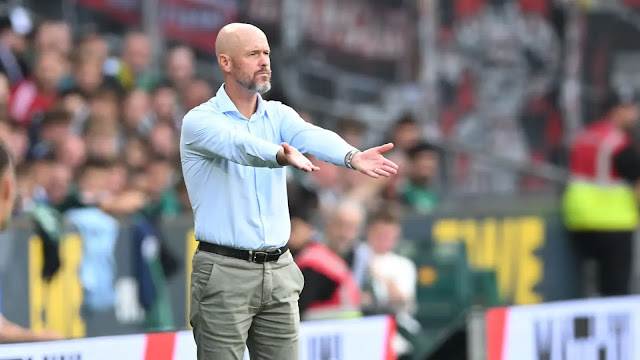In a stunning development in European football, Bayer Leverkusen, the 2023-24 Bundesliga champions, have sacked their manager, Xabi Alonso, after just two games into the 2025-26 Bundesliga season. The decision, announced on September 1, 2025, sent shockwaves through the footballing world, prompting reactions from peers, pundits, and fans alike. Among those expressing disbelief was Manchester United manager Erik ten Hag, who described the move as a “complete surprise” during a press conference ahead of United’s Premier League match against Tottenham Hotspur. The sacking, attributed to Leverkusen’s poor start and internal strategic shifts, raises questions about the pressures facing modern football managers, the expectations at top clubs, and the volatile nature of the sport’s managerial landscape.
This article delves into the details of Alonso’s dismissal, explores its implications for Leverkusen, Alonso, and the broader football ecosystem, and situates the event within the context of managerial trends, club dynamics, and the socio-economic forces shaping European football. It also offers policy recommendations to address the challenges of managerial instability and foster sustainable success for clubs and coaches.
Details of the Sacking
Bayer Leverkusen’s decision to part ways with Xabi Alonso was confirmed through an official statement on their website on September 1, 2025. The club cited a “strategic realignment” and dissatisfaction with the team’s performance in the opening two Bundesliga matches as the reasons for the sacking. Leverkusen lost their season opener 2-1 to Borussia Mönchengladbach and drew 1-1 against newly promoted Holstein Kiel, results that left them in 14th place with one point. The statement thanked Alonso for his contributions, particularly his role in securing the club’s historic first Bundesliga title in 2023-24 and their DFB-Pokal triumph, but emphasized the need for a “new direction” to maintain competitiveness.
Erik ten Hag, speaking at a press conference on September 1, 2025, expressed shock at the decision, highlighting Alonso’s achievements and the brevity of his tenure this season. “It’s a complete surprise to see Xabi Alonso sacked after just two games,” ten Hag said. “What he did at Leverkusen was remarkable—winning the Bundesliga unbeaten, the DFB-Pokal, and competing so well in Europe. To make such a decision so early is very surprising, but this shows the pressure in football today.”
The sacking followed reports of internal disagreements between Alonso and Leverkusen’s sporting director, Simon Rolfes, over transfer policies and squad management. Despite retaining key players like Florian Wirtz and Victor Boniface, the club’s failure to secure high-profile signings in the summer of 2025 reportedly frustrated Alonso, who sought greater investment to compete with Bayern Munich and Borussia Dortmund. The appointment of an interim manager, with former RB Leipzig coach Jesse Marsch linked as a potential replacement, signals Leverkusen’s intent to act swiftly to stabilize the squad.
Background: Xabi Alonso’s Tenure at Leverkusen
Xabi Alonso’s journey at Bayer Leverkusen provides critical context for understanding the shock of his sacking. Appointed in October 2022 when Leverkusen were languishing in the Bundesliga’s relegation zone, Alonso transformed the club into a powerhouse. His tactical acumen, rooted in a high-pressing, possession-based style, led Leverkusen to a sixth-place finish in 2022-23 and a Europa League semi-final appearance. The 2023-24 season was historic, as Leverkusen went unbeaten in the Bundesliga, securing their first-ever title with 90 points, and won the DFB-Pokal, defeating Kaiserslautern 1-0 in the final. Their Europa League campaign ended in a final loss to Atalanta, but Alonso’s reputation soared, making him a target for clubs like Liverpool, Real Madrid, and Bayern Munich.
Alonso’s success was built on a core of talented players, including Florian Wirtz, Jeremie Frimpong, and Victor Boniface, complemented by strategic signings like Granit Xhaka. His philosophy, influenced by mentors like Pep Guardiola and Carlo Ancelotti, emphasized attacking fluidity and defensive solidity, earning Leverkusen the nickname “Neverkusen” for their relentless consistency. By the end of the 2024-25 season, Leverkusen finished third in the Bundesliga and reached the Champions League quarter-finals, cementing Alonso’s status as one of Europe’s brightest young managers.
However, the 2025-26 season began poorly, with the loss to Mönchengladbach exposing defensive frailties and the draw against Kiel highlighting a lack of clinical finishing. Fan reactions on X reflected frustration, with some questioning Alonso’s tactics, while others criticized the club’s board for lacking patience. “Sacking Xabi after two games is insane. Leverkusen owe him everything,” one user posted, capturing the sentiment of disbelief shared by ten Hag and others.
Strategic Motivations for Leverkusen’s Decision
Bayer Leverkusen’s decision to sack Alonso, while shocking, reflects a combination of strategic, competitive, and financial considerations:
Pressure for Instant Results: The Bundesliga is a highly competitive league, with Bayern Munich and Borussia Dortmund setting high standards. Leverkusen’s board, buoyed by their 2023-24 title, expected a strong defense of their crown. The early-season stumbles, particularly against a promoted side like Kiel, likely alarmed stakeholders, prompting a swift reaction.
Internal Disagreements: Reports of tensions between Alonso and Simon Rolfes over transfer strategy suggest a breakdown in trust. Alonso’s push for marquee signings, such as a top-tier striker to complement Boniface, was reportedly rebuffed due to financial constraints, leading to frustration.
Champions League Ambitions: Leverkusen’s participation in the 2025-26 Champions League heightened expectations. A poor domestic start risked undermining their European campaign, prompting the board to act decisively to avoid a broader crisis.
Financial Considerations: Leverkusen, while backed by pharmaceutical giant Bayer, operates with a more modest budget than Bayern or Dortmund. Alonso’s sacking, though costly in terms of severance, allows the club to realign resources toward a new manager and potential signings in January 2026.
Fan and Stakeholder Pressure: Leverkusen’s fanbase, accustomed to success under Alonso, expressed disappointment on platforms like X, but some called for change, citing a perceived dip in intensity. The board’s decision may reflect an attempt to preempt further unrest.
Implications for Xabi Alonso’s Career
Alonso’s sacking marks a critical juncture in his burgeoning managerial career:
Immediate Opportunities: At 43, Alonso remains one of Europe’s most sought-after coaches. Clubs like Real Madrid, where he played from 2009 to 2014, and Liverpool, where he was a fan favorite, are likely to monitor his availability. Posts on X speculate about a potential move to Manchester City if Pep Guardiola departs in 2026.
Reputation Resilience: Despite the sacking, Alonso’s achievements at Leverkusen—an unbeaten Bundesliga title and a domestic cup—ensure his reputation remains intact. His tactical brilliance and ability to develop young players, like Wirtz, make him a prime candidate for top jobs.
Learning Opportunity: The early sacking offers Alonso a chance to reflect on his approach, particularly in managing board relationships and adapting to squad limitations. His next role will test his ability to navigate similar pressures.
International Prospects: Alonso’s success has sparked discussions about his potential to manage Spain’s national team in the future. His sacking, while a setback, does not diminish his long-term prospects.
Personal Resilience: Alonso’s calm demeanor, shaped by his playing career under pressure at Liverpool and Real Madrid, will likely guide him through this challenge. His ability to rebound could define his legacy.
Implications for Bayer Leverkusen
Leverkusen’s decision carries significant risks and opportunities:
Squad Morale: The sacking could disrupt team cohesion, particularly for players like Wirtz and Boniface, who thrived under Alonso. The interim manager must quickly establish authority to maintain performance levels.
Competitive Standing: A third-place finish in 2024-25 and a strong squad position Leverkusen to compete, but the managerial change could destabilize their title defense and Champions League campaign.
Fan Reaction: The polarized response on X, with some fans supporting the board and others decrying the lack of patience, highlights the challenge of maintaining fan support. The new manager must deliver results to quell dissent.
Strategic Realignment: The appointment of a new manager, potentially Jesse Marsch, offers a chance to refresh tactics and address Alonso’s perceived shortcomings, such as defensive vulnerabilities exposed early in 2025-26.
Financial Impact: The cost of Alonso’s severance and hiring a new manager could strain Leverkusen’s budget, necessitating prudent transfer activity in January 2026.
Broader Context: Managerial Pressures in European Football
Alonso’s sacking reflects broader trends in European football’s managerial landscape:
Short-Termism: The rapid dismissal after two games underscores the growing impatience of club boards. In the Premier League, managers like Mauricio Pochettino at Chelsea faced similar scrutiny, with ten Hag himself under pressure at Manchester United after a mixed 2024-25 season.
Financial Stakes: The influx of investment from state-backed entities and private equity, as seen in the Premier League and Bundesliga, has raised expectations. Leverkusen’s backing by Bayer amplifies the pressure to deliver consistent results.
Tactical Evolution: Modern football demands adaptability, with managers expected to implement complex systems quickly. Alonso’s high-pressing style, while successful, required constant evolution, and early struggles highlighted the difficulty of sustaining excellence.
Fan and Media Influence: Social media platforms like X amplify fan reactions, influencing board decisions. Posts criticizing Leverkusen’s board for “panicking” reflect the power of public sentiment in modern football.
Global Talent Pool: The managerial market is increasingly global, with coaches like Alonso, ten Hag, and Marsch moving across leagues. This mobility creates opportunities but also intensifies competition, as clubs seek instant success.
Socio-Economic Context: Football’s Economic Ecosystem
The sacking must be viewed within the socio-economic context of football:
Economic Pressures: European football’s financial landscape, with rising wages and transfer fees, places immense pressure on clubs to justify investments. Leverkusen’s modest budget compared to Bayern Munich necessitates cost-effective decisions, making Alonso’s sacking a calculated risk.
Fan Expectations: Fans, empowered by social media, demand instant results, amplifying pressure on boards. Leverkusen’s fanbase, accustomed to Alonso’s success, expected a title challenge, making the early losses unacceptable to some.
Globalization of Football: The influx of international managers and players has globalized the sport, but also created volatility. Alonso’s sacking reflects the transient nature of modern coaching, with clubs willing to make bold moves to stay competitive.
Mental Health of Managers: The intense scrutiny faced by managers like Alonso highlights the mental health toll of the role. Initiatives like the Premier League’s support for mental health awareness could be expanded to protect coaches.
Economic Impact on Communities: Leverkusen, a club rooted in the city of Leverkusen, supports local economies through matchday revenue and tourism. A successful season under a new manager could boost these benefits, while failure could have ripple effects.
Challenges for Leverkusen and Alonso
For Leverkusen:
Managerial Transition: Appointing a new manager mid-season risks disrupting squad dynamics and fan support. The interim period will be critical for maintaining competitiveness.
Player Retention: Key players like Wirtz and Boniface may attract interest from rivals if results falter, threatening Leverkusen’s long-term stability.
Fan Backlash: The polarized reaction on X suggests a risk of fan discontent if the new manager fails to deliver. Engaging supporters through transparent communication is essential.
European Competitiveness: A poor Champions League campaign could damage Leverkusen’s reputation and revenue, necessitating a swift recovery.
For Alonso:
Reputation Management: While his achievements ensure interest from top clubs, the sacking could raise questions about his adaptability under pressure.
Next Move: Securing a high-profile role quickly is crucial to maintain momentum. A move to a club like Real Madrid or Liverpool would reaffirm his status.
Mental Resilience: The abrupt dismissal may affect Alonso’s confidence, requiring support from his network to navigate this setback.
Opportunities for Renewal
For Leverkusen:
Fresh Tactical Perspective: A new manager could address Alonso’s tactical shortcomings, such as defensive vulnerabilities, and reinvigorate the squad.
Fan Engagement: Leveraging the sacking to rally fans around a new vision could strengthen community support, particularly if results improve.
Youth Development: Investing in academy talents like Wirtz can sustain Leverkusen’s competitiveness, reducing reliance on expensive signings.
For Alonso:
High-Profile Opportunities: Interest from clubs like Real Madrid and Liverpool offers a chance to elevate his career, building on his Leverkusen success.
Learning Experience: The sacking provides Alonso with insights into managing board expectations and squad dynamics, strengthening his future roles.
Global Influence: Alonso’s reputation as a player and coach positions him to influence football globally, potentially through international roles or punditry.
Policy Recommendations
To address the challenges of managerial instability and foster sustainable success, the following recommendations are proposed:
Longer Managerial Tenures: Clubs should adopt policies to give managers more time to implement their visions, as suggested by ten Hag’s comments on patience. A minimum two-year contract could reduce premature sackings.
Transparent Decision-Making: Boards should communicate sacking rationales clearly to fans, reducing backlash. Leverkusen’s vague “strategic realignment” statement fueled speculation.
Mental Health Support: Leagues and clubs should provide mental health resources for managers, addressing the pressures highlighted by Alonso’s sacking.
Balanced Transfer Policies: Clubs should align transfer strategies with managerial visions to avoid conflicts, as seen between Alonso and Rolfes.
Fan Engagement Platforms: Leveraging platforms like X for transparent communication can build trust, addressing fan concerns about sackings.
Regulatory Oversight: UEFA and national leagues should monitor sacking trends to promote stability, potentially incentivizing clubs to retain managers through financial bonuses.
Youth and Local Talent Investment: Clubs like Leverkusen should prioritize academy development to reduce reliance on expensive signings, ensuring long-term sustainability.
Broader Implications for Football
Alonso’s sacking has far-reaching implications:
Managerial Volatility: The trend of rapid sackings, as seen with Alonso and others like Pochettino, underscores the need for a cultural shift toward patience in football management.
Economic Impact: Managerial changes affect club finances, fan revenue, and local economies. Leverkusen’s success under a new manager could boost the city’s economy, while failure could harm it.
Global Talent Market: The mobility of managers like Alonso reflects football’s globalization, but also highlights the need for better support systems for international coaches.
Fan Influence: Social media’s role in amplifying fan reactions, as seen on X, underscores the growing power of supporters in shaping club decisions.
Mental Health Awareness: Alonso’s sacking highlights the mental toll on managers, aligning with broader calls for mental health support in sports.
Looking Ahead: A New Chapter for Leverkusen and Alonso
The sacking of Xabi Alonso after two Bundesliga games is a stark reminder of the relentless pressure in modern football. For Bayer Leverkusen, the decision marks a bold, if risky, move to maintain their competitive edge, with the new manager tasked with building on Alonso’s legacy. For Alonso, the sacking is a temporary setback in a promising career, with top clubs likely to vie for his services.
Erik ten Hag’s description of the move as a “complete surprise” captures the sentiment of a footballing world grappling with the balance between instant results and long-term vision. As Leverkusen navigates this transition and Alonso seeks his next challenge, the episode underscores the need for patience, transparency, and support in football’s high-stakes environment. By addressing these challenges, the sport can foster sustainable success for clubs, managers, and fans alike.







